What Is a Vehicle Purchase Agreement?
April 21, 2023
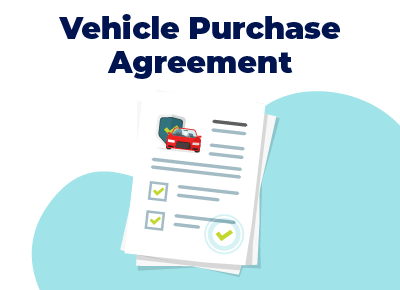

I am a serial entrepreneur and a consumer advocate. When I’m not helping car buyers, I love working on ventures that have a positive impact.
I run a cause marketing agency and serve on the board of Vayu Global Health where we are disrupting the medical industry and preventing the needless deaths of mothers and babies during childbirth.
A vehicle purchase agreement is an official document that lists important buyer information, vehicle information including the VIN, an itemized list of features, and financing information.
Here’s everything you need to know about vehicle purchase agreements.
Table of Contents
- What Is a Car Purchase Agreement?
- What Is Included in a Vehicle Purchase Agreement?
- What to Look Out for in a Vehicle Purchase Agreement
- Is a Vehicle Purchase Agreements Legally Binding?
- What is a Damage Disclosure Statement?
- How to Write a Vehicle Purchase Agreement
- Best 0% APR Deals by Category
- Frequently Asked Questions
What Is a Car Purchase Agreement?
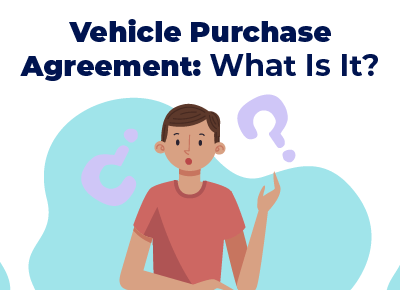
A car purchase agreement, also known as a bill of sale, is the definitive document signed by you and the car dealer that finalizes the purchase of your car.
This car purchase agreement will need to include essential details about the vehicle and the sale in plain terms.
This includes things like:
- Buyer Information - Buyer’s name, address, birth date, and social security number.
- Vehicle Information - Vehicle make, model, color, VIN, and odometer reading at the time of sale
- Itemized List of Total Price - Including the cost of the vehicle, the down payment, documentation fees, sales tax, accessories, and any other relevant charges.
- Financing Information - Including Annual Percentage Rate, finance charge, the total amount financed, total payments, total sale price, as well as the value of any trade-in if applicable.
What Is Included in a Vehicle Purchase Agreement?
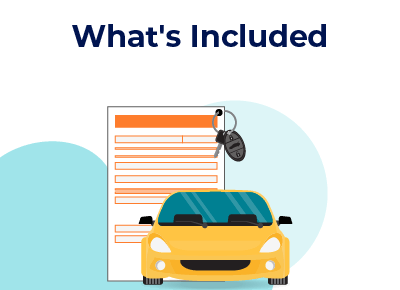 Buyer Information
Buyer Information
The vehicle purchase agreement includes key buyer information like the buyer’s name, address, birth date, and social security number.
Vehicle Information
The purchase agreement for a vehicle also describes the vehicle. The agreement will have the VIN stated on it and its year, make, and model. The odometer reading at the time of sale should also be marked.
Sales and Pricing Information
There will be an itemized list of the total price. The list will include the price of the vehicle, accessories, documentation fees, sales tax, advertising fees, and more. It will also list out a down payment. You’ll be able to see the total sale price for the purchase.
Financing Information
The agreement also lays out any financing information. It will have information about the Annual Percentage Rate you are charged each year, the finance charge, the total amount financed, the total payments, and the total sale price. If you traded in a vehicle as part of the transaction, the trade-in value will be noted here.
What to Look Out for in a Vehicle Purchase Agreement
Car sale contracts are rarely perfect. Before signing, it’s important to review the purchase agreement for a car carefully. Here are some common mistakes to look out for:
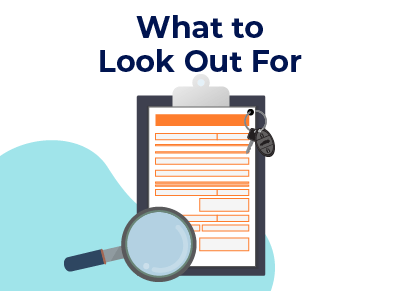 Missing or Inaccurate Personal Information. Double-check that all of the information about you is correct. Incorrect personal information can lead to complications down the road.
Missing or Inaccurate Personal Information. Double-check that all of the information about you is correct. Incorrect personal information can lead to complications down the road.- Extra Fees. Hidden fees are not always easy to spot, and they are commonly used. If any fees you were not expecting come up, you can inquire about them further or ask that they be removed.
- Charges for “Free” Add-ons. Many dealerships offer free add-ons for vehicles. To ensure you do not pay for add ons that were promised as free, the contract must state they cost $0.
- Loan Terms. The interest rate drastically impacts your total cost to finance. Review the interest rate to make sure it matches what you agreed on, and carefully review the loan terms.
- Down Payment. Make sure the down payment on the contract accurately reflects what you will pay. This ensures you pay the correct amount throughout the rest of the financing period.
- Trade-in Amount. If you trade in a vehicle as part of the transaction, make sure the correct value is noted on the agreement.
Is a Vehicle Purchase Agreements Legally Binding?
Yes, the purchase agreement for a car is indeed a legally binding document. Once both parties involved, the buyer and the seller, have signed the agreement, it becomes enforceable under contract law.
The act of signing indicates the parties' consent to the terms and conditions outlined in the agreement, creating a legally binding obligation for both sides to fulfill their respective responsibilities.
It's crucial for all parties to thoroughly review the agreement and understand its terms before signing to ensure they are comfortable with the obligations and protections outlined within the document. Seeking legal advice or guidance specific to your jurisdiction can provide further clarity and ensure compliance with local laws and regulations.
What is a Damage Disclosure Statement?
A damage disclosure statement is a document used in the context of buying or selling a vehicle to disclose any known damage or issues with the vehicle. It provides a comprehensive and transparent account of the vehicle's condition, including prior accidents, repairs, or significant damage.
The purpose of a damage disclosure statement is to inform the potential buyer about any existing damage or issues that may affect the vehicle's value, safety, or performance. This statement is typically required by law in many jurisdictions to protect the buyer's interests and ensure that they have accurate information about the vehicle before making a purchasing decision.
How to Write a Vehicle Purchase Agreement
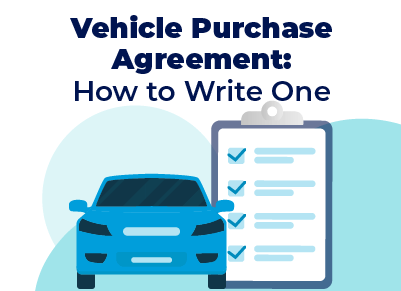 You can generate your own bill of sale here.
You can generate your own bill of sale here.
Identify the Buyer and Seller
The beginning of the vehicle purchase agreement should state the legal names of the buyer and seller. It should also clarify that the contract is for buying a car. Also, list the buyer and seller’s addresses as well as their drivers’ license numbers.
Describe the Vehicle
Clearly identify the vehicle. Include the vehicles:
- Make and model
- Year
- Color
- Body type
- Interior color
- Unique features of the car
- Vehicle Identification Number (VIN)
- Odometer reading
Describe the vehicle’s condition as well. If the seller sells the vehicle “as is” then the buyer is liable for any problems. Make sure any known issues of a used car are identified. For used cars, include details about warranties.
Review the Information
Review the information to ensure it’s correct. Any fraudulent claims will nullify the contract. The odometer reading should match what is on the contract.
Date of Sale and Purchase Price
Next, write out the date of sale and purchase price. Detail the method of purchase as well. Here is where you will include information about financing if the buyer is financing the car. Include all sales and price information as well as financing details.
Detail the Delivery Method
Next, you must indicate the delivery method if the car is not local. Clearly state the method and responsibility for delivery. The seller can deliver the vehicle, the buyer can pick it up, or the vehicle can be shipped. Indicate who is responsible for the delivery expense.
Title Status
Owners can only sell vehicles with clean titles. The contract should specify the status of the title, indicating it is free from liens and that the seller is the legal owner.
Sign and Date
After each party carefully reviews the contract, it’s time to sign it. If it is a private purchase, then ideally, a witness should sign as well. Both parties should retain a copy of the contract.
Taking your time to understand and review the vehicle purchase contract will ensure a smooth sales process. Doing your due diligence upfront can save you from costly mistakes. Investing time to inspect the vehicle purchase agreement carefully is essential for ensuring an accurate purchase.
Best 0% APR Deals by Category
Frequently Asked Questions
What is a vehicle purchase agreement?
The vehicle purchase agreement is a contract that details the sale of a vehicle. It must identify the buyer and seller, the vehicle in question, the payment terms, and more.
Is a vehicle purchase agreement legally binding?
Yes, a purchase agreement is a legally binding document. As a contract, it becomes legally binding as soon as both parties sign it.
Is a vehicle purchase agreement the same as a bill of sale?
The vehicle purchase agreement is different from the bill of sale. The purchase is legally binding and signed by both parties. The bill of sale is given when the car is sold in a private sale, and you will need to bring the bill of sale to re-register the car and transfer the title.
What happens after you sign the contract to buy a car?
Once the contract to buy a car is signed by both parties, the sale becomes legally binding. This means both buyer and seller must adhere to the terms set out in the contract.
Can I back out of a vehicle purchase contract after I sign it?
Most often, you cannot back out of the vehicle purchase contract once you’ve signed it. Car dealers do not have policies that allow this. The only way to attempt to get out of the agreement is in court. Most courts will only consider this if something in the agreement is fraudulent or misleading.
Can I write my own vehicle purchase agreement?
When purchasing from a dealer, the dealer will most often write the purchase agreement for you to review. For private purchases, you can draft your own vehicle purchase agreement using the steps outlined above. There are also many simple online templates for vehicle purchase agreements.
Posted in Car Buying Tips, Car Trade-In & Sell |




